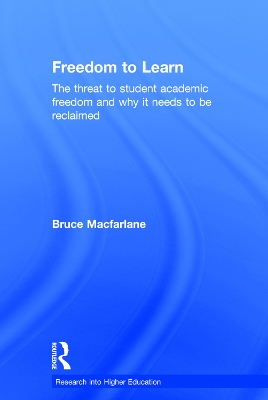Research into Higher Education
2 total works
The freedom of students to learn at university is being eroded by a performative culture that fails to respect their rights to engage and develop as autonomous adults. Instead, students are being restricted in how they learn, when they learn and what they learn by the so-called student engagement movement. Compulsory attendance registers, class contribution grading, group project work and reflective learning exercises based on expectations of self-disclosure and confession take little account of the rights of students or individual differences between them. This new hidden university curriculum is intolerant of students who may prefer to learn informally, are reticent, shy, or simply value their privacy. Three forms of student performativity have arisen - bodily, participative and emotional – which threaten the freedom to learn.
Key themes include:
- A re-imagining of student academic freedom
- The democratic student experience
- Challenging assumptions of the student engagement movement
- An examination of university policies and practices
Freedom to Learn offers a radically new perspective on academic freedom from a student rights standpoint. It analyzes the effects of performative expectations on students drawing on the distinction between negative and positive rights to re-frame student academic freedom. It argues that students need to be thought of as scholars with rights and that the phrase ‘student-centred’ learning needs to be reclaimed to reflect its original intention to allow students to develop as persons. Student rights – to non-indoctrination, reticence, in choosing how to learn, and in being treated like an adult – ought to be central to this process in fostering a democratic rather authoritarian culture of learning and teaching at university.
Written for an international readership, this book will be of great interest to anyone involved in higher education, policy and practice drawing on a wide range of historical and contemporary literature related to sociology, philosophy and higher education studies.
What is 'intellectual leadership' and how might this concept be better understood in the modern university? Drawing on research into the role of full or chair professors, this book argues that it is important to define and reclaim intellectual leadership as a counter-weight to the prevailing managerial culture of higher education. It contends that professors have been converted into narrowly defined knowledge entrepreneurs and often feel excluded or marginalised as leaders by their own universities. To fulfil their role professors need to balance the privileges of academic freedom with the responsibilities of academic duty. They exercise their academic freedom as critics and advocates but they also need to be mentors, guardians, enablers and ambassadors. Four orientations to intellectual leadership are identified: knowledge producer, academic citizen, boundary transgressor and public intellectual. These orientations are illustrated by reference to the careers of professors and show how intellectual leadership can be better understood as a transformational activity. This book tackles the question of what intellectual leadership actually is and analyses the questions most frequently associated with the role of senior academics, including:
- How can intellectual leadership be distinguished from other forms of leadership and management?
-
- How can professors balance their responsibilities both within and beyond the university?
-
- How can universities make better use of the expertise of professors as leaders?
It concludes with recommendations for senior institutional managers on how to make more effective use of the expertise and leadership potential of the senior professoriate.

